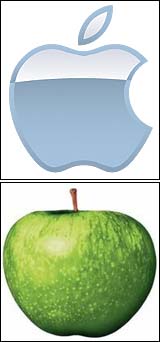
Apple vs Apple
In May 2006, the music company owned by
Apple Corps lost its legal battle against
Apple Computer over the US firm's use of an apple logo for iTunes.
To get the parties straight: Apple Corps is owned by Paul McCartney, Ringo Starr and the families of John Lennon and George Harrison and is known as the “Beatles label”.
Apple started as
Apple Records in 1968 by the Beatles as a
tax shelter.
The label still releases compilations by the Beatles, such as The Beatles Anthology. The holding company, Apple Corps is the participant in the Apple Feud.
Apple Computers on the other hand, is
Steve Jobs’ brainchild that produces the tremendously popular iPods.
The two Apples struck a deal in 1991 deal (at that time, Steve Jobs was not part of the company) that forbade Apple Computer to use the apple logo “in connection with musical content.”
Each company agreed to a strict "field of use", setting out areas in which each party would have exclusive use of their respective fruit-shaped logos.
Apple Corps got ticked off when
iPod took the world by storm, including the UK.
The first iPods were sold in October 2001.
The
iTunes Music Store first opened for business in the US in April 2003 and went on to conquer Europe, Australia, Japan, and Canada.
Apple has sold more than 50m iPods worldwide since 2001, and more than 1bn tracks online.
Apple Corps filed suite, claiming that Apple Computers violated their pledge not to sell music.
Apple Computer argued that the earlier deal did not foresee the rise of digital music or the difference between being a service supplier and a content creator.
Since iTunes was primarily a data transmission service, it is permitted under the terms of the agreement.
Since Apple Corps didn’t own the rights to the music, there is no objection for Apple Computer to use its logo in its stores and on its devices.
The high court in London ruled that Apple Computer hadn’t infringed upon Apple Corp's trademarks by selling music through its iTunes Music Store.
"
I find no breach of the trademark agreement has been demonstrated. The action therefore fails," said Mr Justice Mann.
In his ruling, he went on to say that Apple Computers was not guilty of breaking the agreement, since the apple logo was only used in association with the company's online shop, and not with the music itself.
The case brought by the Beatles' label was therefore dismissed.
Will this be the end of the feud that started in 1978 when Apple Corps sued Apple Computer for trademark violations?
Doubtful, but it makes for some interesting courtroom antics.
You see, Justice Mann is an iPod owner and
Geoffrey Vos,
QC, representing Apple Corps, demonstrated what he claimed was the computer firm's conversion to the music business by using an Apple computer to download
Chic's 1978 disco hit "
Le Freak".
Mr Justice Mann was also treated to
Coldplay's "
Speed of Sound".
Mmmm, sometimes being a judge must be music to one’s ears…..
 A creative firebomb defense
A creative firebomb defense